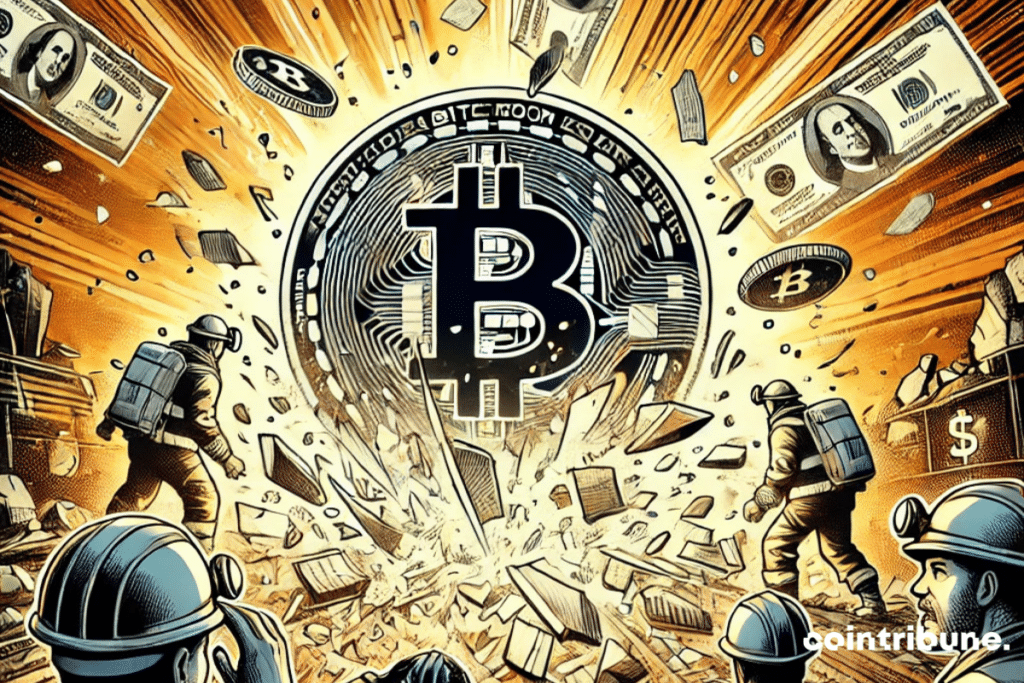Bitcoin Could Be Destroyed with Just $10 Billion, Expert Warns
“Bitcoin… is cooked.” The provocative statement from Justin Drake, a researcher affiliated with Ethereum, has ignited discussions online. According to him, an investment of 10 billion dollars would be enough to annihilate the Bitcoin network. However, behind this assertion lies a troubling misunderstanding of what makes the protocol resilient. Far from being a weakness, the cap of 21 million units and Bitcoin’s energy security make it a colossus with feet of clay… at least, in appearance. If Bitcoin were to fail, no cryptocurrency would survive. Here’s why.

The $10 Billion: a theoretical catastrophe scenario…
Justin Drake argues that a 51% attack — where an actor controls more than half of the network’s computing power — would cost “only” 10 billion dollars.
Theoretically, this is possible. Practically, it ignores the reality of mining infrastructures. To mobilize 10 gigawatts of electricity (equivalent to the annual consumption of countries like Jordan), months or even years of coordination between states would be necessary. An operation nearly impossible to conceal and economically absurd: why destroy a network whose value relies on trust?
Critics overlook a crucial detail: Bitcoin transforms energy into security. ASICs (mining hardware) are only used to protect the network. In the case of an attempted attack, their value would collapse, rendering the initial investment obsolete.
Moreover, as James Check (a Bitcoin analyst) points out, struggling miners sell their equipment at low prices, allowing new players to maintain decentralization. A natural self-regulation, absent on Ethereum.
Finally, the argument regarding energy costs overlooks technological advancements. Miners are already using flared gas, surplus hydropower, or managing unstable electrical grids (e.g., Texas). Tomorrow, nuclear or green hydrogen will further reduce their footprint. Bitcoin does not consume passively: it optimizes. This flexibility cannot be imitated by Proof-of-Stake blockchains (like Ethereum).
Bitcoin vs. ETH: the war of economic models
Drake criticizes Bitcoin for its annual issuance (currently 0.83%), deemed too high compared to Ethereum. This reasoning is fallacious. The programmed scarcity of Bitcoin — 21 million, period — makes it a deflationary asset by design.
Conversely, Ethereum alternates between inflationary and deflationary phases based on updates. Its monetary model resembles a permanent experiment, far from the predictability of Bitcoin.
Critics point to Bitcoin’s dependence on block rewards (99% of miners’ revenue). But this overlooks the fact that these rewards halve every 4 years (halving), forcing a transition to transaction fees.
A slow process, but intentional. Just as gold needs vaults, securing Bitcoin will come at a cost… which users will bear, as the stored value justifies it. Ethereum, by burning fees according to shifting rules, creates systemic instability.
Ethereum aims to be “ultrasonic,” a blend of low issuance and aggressive burning. But this perpetual quest for fine-tuning makes it vulnerable to the whims of developers.
Bitcoin, on the other hand, focuses on immutability: its code changes slowly because each modification threatens its status as “sound money.” The result: Bitcoin is the only cryptocurrency that has survived every major crisis (MtGox, state bans, bear markets). The ultimate proof of its robustness.
Attacks against Bitcoin speak volumes about its reference status. If Drake and Sassano see an “obvious catastrophe,” it may be because Ethereum, despite its innovations, remains an outsider against the cultural and technological grounding of Bitcoin. One truth arises: without Bitcoin, cryptocurrencies would never have existed. And if it were to fall, it would mean the collapse of the entire crypto sphere. But judging from its 15 years of resistance to apocalyptic predictions, Bitcoin has already won its bet: to be the currency of centuries, not of hype cycles.
Maximize your Cointribune experience with our "Read to Earn" program! For every article you read, earn points and access exclusive rewards. Sign up now and start earning benefits.

Fascinated by Bitcoin since 2017, Evariste has continuously researched the subject. While his initial interest was in trading, he now actively seeks to understand all advances centered on cryptocurrencies. As an editor, he strives to consistently deliver high-quality work that reflects the state of the sector as a whole.
The views, thoughts, and opinions expressed in this article belong solely to the author, and should not be taken as investment advice. Do your own research before taking any investment decisions.